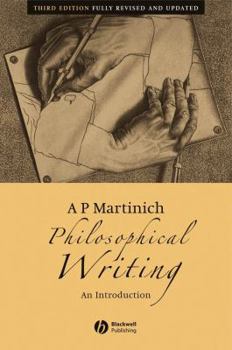Philosophical Writing 3e
Select Format
Select Condition 
Book Overview
Substantially updated and revised, the third edition of Philosophical Writing is designed to help those with little or no experience in philosophy to think and write successfully. Traces the evolution of a good philosophical essay from draft stage to completion Now includes new examples of the structures of a philosophical essay, new examples of rough drafts, tips on how to study for a test and a new section on how to utilize the internet effectively Written with clarity and wit by a bestselling author
Format:Paperback
Language:English
ISBN:1405131675
ISBN13:9781405131674
Release Date:July 2005
Publisher:John Wiley & Sons
Length:202 Pages
Weight:0.74 lbs.
Dimensions:0.7" x 6.9" x 9.0"
Customer Reviews
2 ratings
A methodical guide intended for novice philosophers to successfully organize their thoughts on paper
Published by Thriftbooks.com User , 19 years ago
Now in an updated and revised third edition, Philosophical Writing: An Introduction is a methodical guide intended for novice philosophers to successfully organize their thoughts on paper. New to the updated edition are examples of the structures of a philosophical essay, new examples of rough drafts, advice for studying for a test, and a new section on how to make effective use of the internet. Written by a professor of philosophy, history, and government, Philosophical Writing: An Introduction is packed from cover to cover with plain terms, good advice, and rigorous structural guidelines, making it a "must-have" reference book, especially for undergraduate philosophy students.
An essential guide
Published by Thriftbooks.com User , 22 years ago
While working on an M.A. in theology, I learned that there is life after grammar and syntax. I have always enjoyed writing in general, and my written work has always received high marks. Writing philosophy, however, is a whole new game, and in Philosophical Writing, A. P. Martinich clearly and concisely explains the rules. Although it is designed for students, anyone interested in arguing well through the written word would benefit greatly from this book.Philosophical Writing consists of eight chapters and two appendices. In the first chapter Martinich points out that students writing philosophical essays are placed in the rather ironic situation: the student must play the role of a writer writing for an audience who (usually) knows the subject matter far better than the writer does. Martinich then offers practical advice for dealing with this odd situation.The second chapter provides a nice, little introduction to the uses of logic in constructing that which is the heart of the philosophical essay: a well formed and well written argument.In chapter three, the structure of a well-formed philosophical essay is discussed. The last half of this chapter contains a tiny essay on Hobbes, which Martinich uses to illustrate his points.In "Composing", the fourth chapter, Martinich offers advice on everything from selecting a topic, through getting the stumped student started researching and writing, to polishing the final draft. From the information presented in this chapter, I have been able to develop an approach to philosophical composition that has been useful throughout the process of writing my masters thesis. This help alone has been worth the price of this book.As in every field, there are tricks of the analytic trade, and in chapter five, Martinich explains seven tactics for analytic writing such as how to know which terms should be defined and how to define them, the role of counterexamples, and how to use dialectical reasoning in one's argument.In the sixth chapter, although no specific rules exist, per se, Martinich discusses what it takes to make a sound argument (a valid argument, the premises of which are true) compelling.The seventh chapter, sort of miniature Strunk and White, presents the elements of philosophical style. This is what separates the great writing from the merely good.Like many, Martinich waits until the end to deal with the introduction. It seems that introductions have difficulties which are peculiar to it, and Martinich offers some advice on dealing with these difficulties.Philosophical Writing concludes with two appendices. Although I am not inclined to procrastinate, Appendix A, "It's Sunday Night and I Have an Essay Due Monday Morning", has saved my backside a couple of times. Interestingly, the content of this appendix provides a good way to get the juices flowing even if the writer is not short on time. The book wraps up with a glossary of philosophical terms and common Latin phrases.As stated in the beginning, anyon





